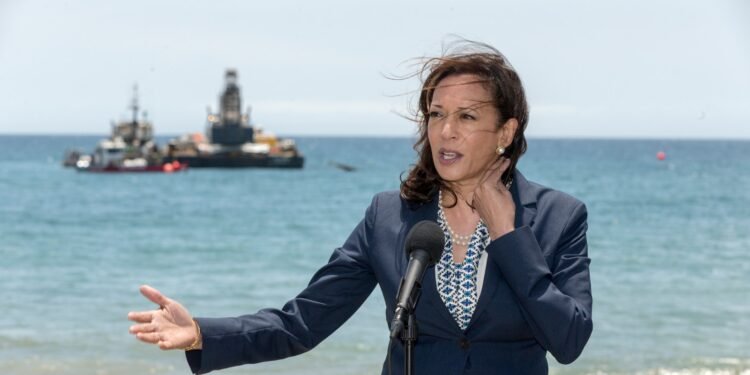On July 21, President Joe Biden withdrew from the 2024 presidential race and endorsed Vice President Kamala Harris to run in his place, launching her to the forefront of potential Democratic nominees. Harris’ term as VP hasn’t produced many significant policy outcomes of her own, but her experience as a California senator and attorney general, as well as her 2020 presidential campaign, point to a consistent record of pro-climate, pro-environmental policies and an evolved understanding of tribal land issues. Should she eventually assume the Oval Office, her career to date signals a likely continuation of the West’s Biden-era gains in the protection of public lands, water and wildlife as well as support for tribal sovereignty.
“We couldn’t be more excited,” said Athan Manuel, director of the Sierra Club’s lands-protection program. Harris worked with the organization on bills to expand California’s public lands, increase access to nature and develop community incentives for wildfire prevention. “She understood the totality of these issues, and that gives us great confidence.”
Over the past four years, the Biden administration reinstated protections for Alaska’s Tongass National Forest and conserved more than 41 million acres of public land. It passed the climate-forward Inflation Reduction Act, which was hailed as a windfall for domestic clean energy jobs and a once-in-a-generation wealth transfer to historically marginalized communities. The record bears a striking resemblance to Harris’ own platform for president, which also pursued environmental justice and sought an end to fossil fuels on public lands.
“This was the most impactful one-term presidency on public lands, climate change and environmental justice,” Manuel said. Harris, who was born in Oakland and spent much of her career in California, was also able to provide the Biden administration with insight into regional issues. “A Westerner leading on all these issues is very significant.”

Prior to joining Biden’s ticket, Harris was best known as a Golden State prosecutor. As California’s attorney general, Harris won multiple settlements against corporate polluters, including a $44 million settlement from the owners of a container ship that spilled 53,000 gallons of oil into the San Francisco Bay. She secured multimillion-dollar deals with oil companies BP, ARCO and ConocoPhillips for negligent monitoring of hazardous materials in gas station storage tanks, and she was part of the team that held Volkswagen accountable for bypassing air pollution regulations, eventually earning more than $86 billion in penalties for the state. However, her claim that she pursued polluters while working in the San Francisco DA office has come under scrutiny.
In the Senate, she co-sponsored bills to develop national wildlife corridors, divert revenue from energy development to national parks and further climate equity by calculating policy impacts on frontline communities. She voted to protect the Antiquities Act and the Great American Outdoors Act, as well as to halt drilling in the Arctic and pass a public-lands package that conserved 2 million acres of land and water. Over the course of four years, she earned multiple perfect scores from the League of Conservation Voters.

Harris’ track record with Indigenous affairs over her decades working in politics is more varied. As state attorney general, she created the first Indian Child Welfare Act Compliance Task Force to protect Native children. But she also opposed multiple tribal applications to put land into “trust” and thereby grow a tribe’s land base. During her time as attorney general, Harris’ office also pursued a legal argument that could have had negative, precedent-setting impacts for tribes that have acquired land in trust. She argued that the Big Lagoon Rancheria, a tribe that was seeking to build a casino on 11 acres of trust land, improperly received that land from the federal government. The case had the potential to open past land-to-trust transfers across Indian Country to litigation, but the 9th Circuit Court of Appeals ultimately ruled against California.
Since then, Harris has distanced herself from that position. When then-Cheyenne River Sioux Tribal Chairman Harold Frazier asked her about this publicly in 2019, Harris said that as California’s attorney general it was her duty to represent the state’s interests, which did not necessarily reflect her own. “As California’s attorney general she was perceived as being more focused on states than tribes,” wrote Mark Trahant (Shoshone-Bannock) in an analysis for ICT. “But that has largely shifted.”
During her 2020 campaign for president, for example, Harris promised to assist tribes in restoring their lands and to make it easier for them to do so in the future. Her campaign also detailed specific policies and initiatives to advance Native voting rights, increase funding for the federal agencies serving tribal communities, and protect Native women and children, building on some of the legislation that she co-sponsored during her time in the Senate. Those bills largely focused on supporting Native health care and addressing the crisis of Missing and Murdered Indigenous Peoples, along with the Native Voting Rights Act of 2019 and other legislation concerning tribal wildlife corridors and food sovereignty.
As vice president, she’s been a part of an administration that has made considerable strides in integrating Indigenous knowledge and tribal priorities into public-lands management, as well as in providing funding for Native-led climate resilience projects and appointing multiple Indigenous people to leadership positions. She was the first sitting vice president to visit the Gila Indian River Community and do an interview with the Native news organization ICT. Asked by reporter Aliyah Chavez (Kewa Pueblo) about the administration’s goals and the decision to appoint Native leaders like Interior Secretary Deb Haaland (Laguna Pueblo), Harris said, “I do believe that we are setting a new model for what the interaction and what the partnership should be [with tribes], always grounded in full appreciation and respect for tribal sovereignty.”
The Democratic Party has less than a month to introduce any alternative candidates before the Democratic National Convention on Aug. 19. Other potential frontrunners, including California Gov. Gavin Newsom, appear to be rallying behind Harris as the primary candidate who could win the race against former President Donald Trump.











